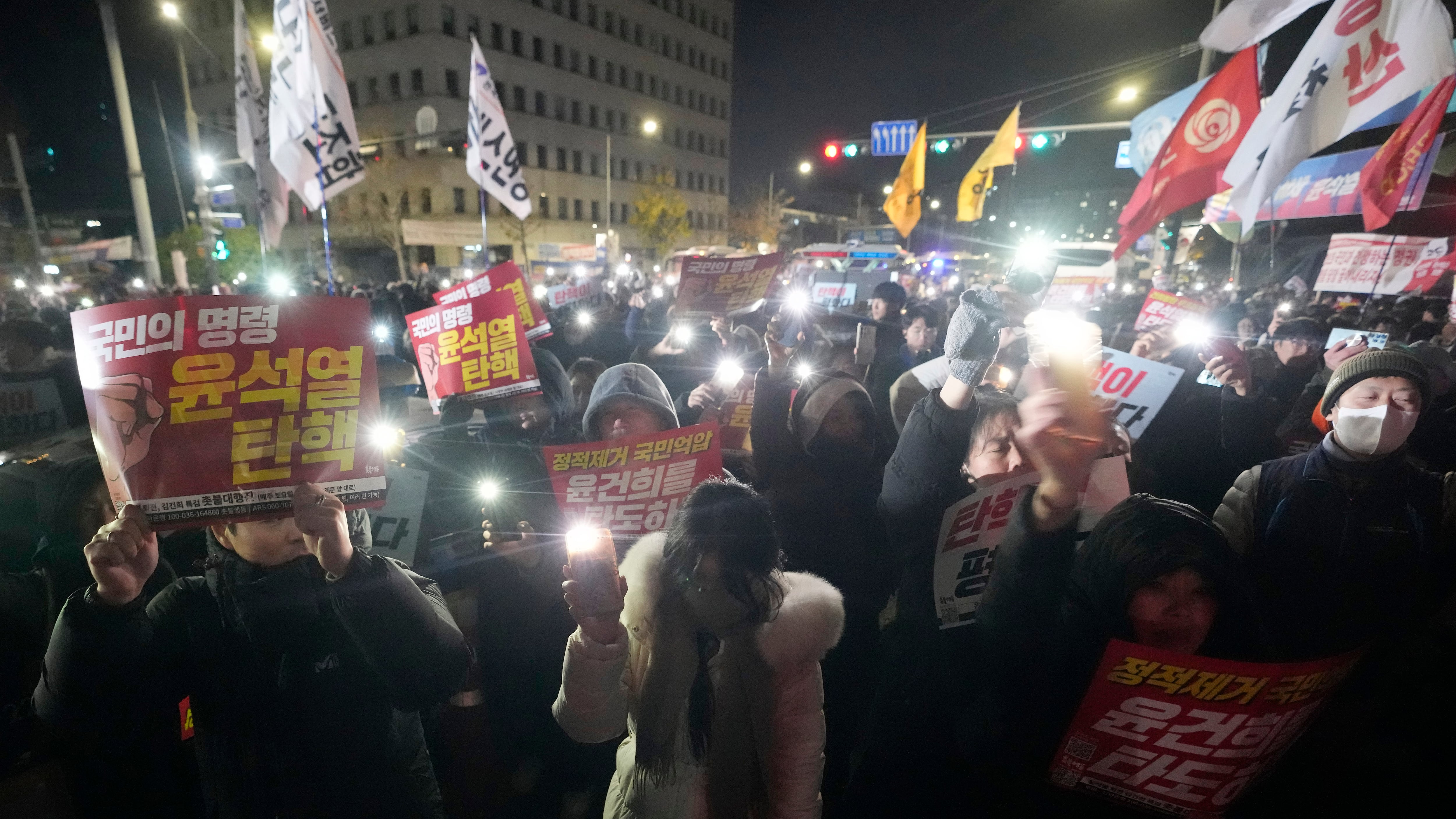TOKYO (AP) — South Korean President Yoon Suk Yeol was facing parliamentary movements on Wednesday to impeach him after he deployed heavily armed forces to the streets of Seoul with his bewildering and sudden declaration of martial law, reminiscent of the country’s past dictatorships.
The opposition parties filed the impeachment motion just a few hours after parliament voted unanimously to cancel Yoon's declaration, which forced him to lift martial law about six hours after it began. To remove Yoon from office, the support of two-thirds of the National Assembly and at least six of the nine judges of the Constitutional Court is required. The opposition Democratic Party, with a progressive tendency, holds the majority in the 300-seat parliament and has called for Yoon's resignation.
PUBLICIDAD
The vote on the impeachment motion could be as soon as Friday, said Democratic Party legislator, Kim Yong-min.
During the tense and surprising hours under martial law, heavily armed forces surrounded the parliament, backed by army helicopters and armored vehicles. Lawmakers scaled walls to enter the building and repelled troops by activating fire extinguishers. Politician and former news anchor Ahn Gwi-ryeong tried to take an assault rifle from a soldier pointing it at her chest while shouting "Aren't you ashamed?"
The lawmakers who managed to re-enter the building rejected Yoon's declaration of martial law by 190-0, including 18 lawmakers from Yoon's party, which forced Yoon to rescind it in a hastily convened government meeting.
Here are the key points about the situation in South Korea:
Yoon declared martial law without prior notice in a speech on Tuesday night in which he promised to eliminate the "anti-state" forces he said were plotting a rebellion, and accused the main opposition parties of supporting the country's rival, North Korea.
Yoon did not provide direct evidence when he raised the threat of North Korea as a destabilizing force. The leader has long maintained that a tough strategy against the North is the only way to prevent Pyongyang from carrying out its nuclear threats against Seoul.
In the late 1980s, South Korea had a series of strongmen who repeatedly alluded to North Korea when trying to control internal dissent and political opposition.
Yoon has had trouble pushing forward his legislative agenda in a parliament dominated by the opposition, while corruption scandals involving him and his wife were emerging.
The opposition criticized Yoon's actions as antidemocratic. The opposition leader, Lee Jae-myung, who narrowly lost to Yoon in the 2022 presidential elections, described Yoon's announcement as "illegal and unconstitutional."
The sudden declaration was also criticized by Yoon's own conservative party leader, Han Dong-hoon, who deemed the decision incorrect and promised to "stop it with the people."
"The people will block the president's unconstitutional actions. The Army must be on the side of the population in any case. Let's oppose with determination," wrote X Kim Dong Yeon, a member of the opposition party and governor of the province of Gyeonggi, surrounding Seoul.
Ordinary South Koreans were in shock. Social media was flooded with messages expressing surprise and concern over Yoon's announcement.
Accusations linking the declaration of emergency to Yoon's political problems soon emerged.
Since taking office in 2022, he has had little success in passing his measures in a parliament controlled by the opposition.
The conservatives have said that the opposition movements are a political revenge for investigations into Lee, who is considered the favorite for the upcoming presidential elections in 2027.
Just this month, Yoon denied any wrongdoing in an influence-peddling scandal involving him and his wife. The accusations have damaged his popularity rating and fueled attacks from his rivals.
The scandal revolves around allegations that Yoon and the first lady, Kim Keon Hee, exerted inappropriate influence over the conservative People Power Party to select a certain candidate to run in a partial parliamentary election in 2022 at the request of Myung Tae-kyun, an electoral intermediary and founder of a polling agency that conducted free opinion polls for Yoon before he became president.
Yoon has said that he did not do anything inappropriate.
South Korea did not become a democracy until the late 1980s, and military intervention in civilian affairs remains a sensitive issue.
During the dictatorships that arose while the country was rebuilding after the Korean War of 1950-53, different leaders occasionally declared martial law, which allowed them to station combat soldiers, tanks, and armored vehicles on the streets or in public places to prevent anti-government protests.
Scenes like those are unimaginable for many people nowadays.
The dictator Park Chung-hee, who ruled South Korea for nearly 20 years before being assassinated by his spy chief in 1979, led several thousand soldiers in Seoul in the early hours of May 16, 1961, in the country's first coup d'état. He declared martial law multiple times to quell protests and imprison critics.
Less than two months after Park's death, Major General Chun Doo-hwan led tanks and troops in Seoul in December 1979 in the country's second coup. The following year, he orchestrated a brutal military crackdown on a pro-democracy uprising in the southern city of Gwangju, which killed at least 200 people.
In the summer of 1987, massive street protests forced Chun's government to accept direct presidential elections. His Army companion, Roh Tae-woo, who had joined Chun's coup in 1979, won the election held later in 1987 largely due to the split votes among progressive opposition candidates.
